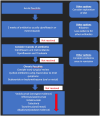The aetiology of pouchitis in patients with inflammatory bowel disease
- PMID: 38812704
- PMCID: PMC11135114
- DOI: 10.1177/17562848241249449
The aetiology of pouchitis in patients with inflammatory bowel disease
Abstract
Restorative proctocolectomy with ileal pouch-anal anastomosis is a treatment option for patients with refractory ulcerative colitis. Pouchitis is the most common complication, representing a spectrum of diseases ranging from acute antibiotic-responsive type to chronic antibiotic-refractory. Early accurate diagnosis using a combined assessment of symptoms, endoscopy and histology is important for both treatment and prognostication. Most patients respond well to antibiotic therapy; however, management of chronic antibiotic-refractory pouchitis remains a challenge, and treatment options are based on small studies. Pouchitis is thought to be driven by the interaction between genetics, the immune system and the environment but as yet a causal relationship has yet to be identified. Further longitudinal assessment of the pouch integrating new technologies may help us understand the factors driving pouchitis. This review outlines the currently understood risk factors and aetiology of pouchitis.
Keywords: IBD; pouchitis; ulcerative colitis.
© The Author(s), 2024.
Conflict of interest statement
The authors declare that there is no conflict of interest.
Figures


Similar articles
-
A prospective evaluation of the long-term outcome of ileal pouch-anal anastomosis in patients with inflammatory bowel disease-unclassified and indeterminate colitis.Dis Colon Rectum. 2009 May;52(5):872-8. doi: 10.1007/DCR.0b013e31819f5d4c. Dis Colon Rectum. 2009. PMID: 19502850
-
Pouchitis.World J Gastroenterol. 2007 Nov 14;13(42):5598-604. doi: 10.3748/wjg.v13.i42.5598. World J Gastroenterol. 2007. PMID: 17948934 Free PMC article. Review.
-
Pouchitis after ileal pouch-anal anastomosis in ulcerative colitis: Diagnosis, management, risk factors, and incidence.Dig Endosc. 2017 Jan;29(1):26-34. doi: 10.1111/den.12744. Epub 2016 Nov 7. Dig Endosc. 2017. PMID: 27681447 Review.
-
Pouchitis: what every gastroenterologist needs to know.Clin Gastroenterol Hepatol. 2013 Dec;11(12):1538-49. doi: 10.1016/j.cgh.2013.03.033. Epub 2013 Apr 16. Clin Gastroenterol Hepatol. 2013. PMID: 23602818 Review.
-
Predictors of pouchitis after ileal pouch-anal anastomosis: a retrospective review.Dis Colon Rectum. 2008 May;51(5):554-60. doi: 10.1007/s10350-008-9194-7. Epub 2008 Feb 12. Dis Colon Rectum. 2008. PMID: 18266037
Cited by
-
Comparative Effectiveness of Bile Acid Sequestrants and Antibiotics in the Management of Acute Pouchitis: A Matched Cohort Study from the United States.Dig Dis Sci. 2025 Apr 16. doi: 10.1007/s10620-025-09039-2. Online ahead of print. Dig Dis Sci. 2025. PMID: 40237906
References
-
- Shen B, Kochhar GS, Kariv R, et al.. Diagnosis and classification of ileal pouch disorders: consensus guidelines from the International Ileal Pouch Consortium. Lancet Gastroenterol Hepatol 2021; 6: 826–849. - PubMed
-
- Yamamoto T, Shimoyama T, Bamba T, et al.. Consecutive monitoring of fecal calprotectin and lactoferrin for the early diagnosis and prediction of pouchitis after restorative proctocolectomy for ulcerative colitis. Am J Gastroenterol 2015; 110: 881–887. - PubMed
-
- Dubinsky V, Reshef L, Bar N, et al.. Predominantly antibiotic-resistant intestinal microbiome persists in patients with pouchitis who respond to antibiotic therapy. Gastroenterology 2020; 158: 610.e13–624.e13. - PubMed
Publication types
LinkOut - more resources
Full Text Sources

